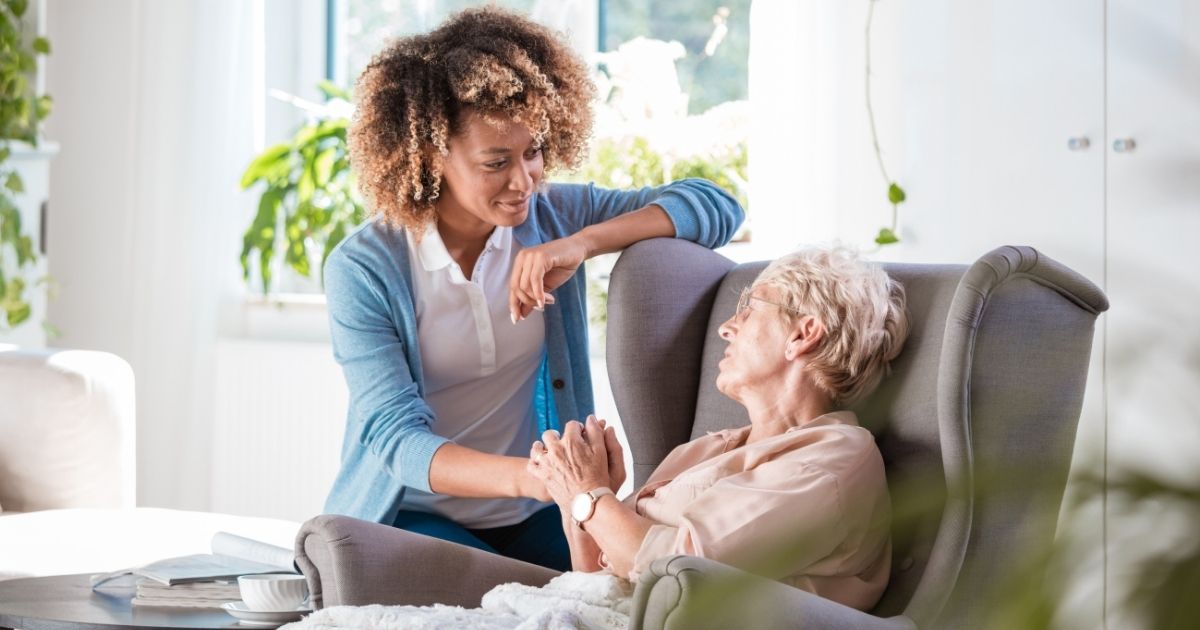Navigating changes in health and offering encouragement.
When helping an aging parent or visiting an older neighbor, it's important to know what behaviors to watch for and the best ways to offer support.
Alison Aubry, MSN, NP-C, is a nurse practitioner at Trinity Health Medical Group, Advanced Care Coordination – Grand Rapids who specializes in geriatric care, specifically dementia, chronic disease management, and nutrition. We connected with her to learn more.
Q: What are some common signs of cognitive decline to watch for, and when should families intervene?
Aubry: The main signs of cognitive decline include:
- Mood, behavioral, and sleep changes
- Falls or difficulty completing day-to-day tasks safely
- Appetite changes and/or weight loss
I encourage prompt intervention if these changes affect quality of life and comfort. Falls, more frequent infections, unplanned weight loss, and missing medications are examples of reasons to contact a primary care provider and begin having conversations about safety.
Safety issues requiring quicker intervention include:
- Driving-related concerns
- Environmental exposure risks, such as not dressing warmly enough for outdoor walks
- Home environment dangers, such as leaving the burner on the stove or not recognizing urgent repair needs
- Medical decline related to self-neglect
Q: How can family members approach conversations about health and well-being without causing distress?
Aubry: A humble, respectful approach goes a long way when discussing health with individuals and families. We all have preferences on how we choose to live, and your loved one should feel respected.
Brain health can be a complicated topic for families to navigate. Still, older adults typically engage in health conversations promoting joy and independence. The best time and place for conversations about concerns is separate from large groups.
Finding ways to relate to their experiences and reduce tension is important. When talking with patients, I often share my experiences with relying on others and needing to ask for help. For example, I ask another person to drive if I know it will be dark outside.
Q: How can families balance respecting an older loved one's independence while ensuring their safety? What signs indicate they might need more help at home?
Aubry: The most common preference is to remain in one's own home safely. If this is an individual's or family's goal, state it openly to their health care provider.
Discuss getting extra help to avoid a serious fall. This can prevent moving to a different place. The most successful adults I see staying in their homes are those who accept help with tasks that are getting harder.
Signs indicating a loved one needs help at home may include:
- Expired or full medication bottles (this suggests a need for medication oversight)
- Skipping meals
- Falls, bruises, skin tears, pressure wounds, or wounds to lower extremities
If you worry about loved ones falling, a good idea is to have them wear a medical alert button. They can wear it on their wrist or as a pendant necklace.
Q: How can families support older loved ones who may be experiencing loneliness or depression?
Aubry: If possible, establish a routine phone call or visit around the same time each day or week. Older loved ones will have something to look forward to, and following a routine reduces anxiety around potentially missing a call or not being close to the door to answer.
Q: What advice do you have for caregivers on managing stress?
Aubry: Give yourself a lot of grace and self-compassion. I see caregivers putting a lot of stress on themselves all year round to keep standards of care for their loved ones, which amounts to a full-time job.
As for aging loved ones, anxiety and stress can exacerbate physical and cognitive conditions.
Q: How can families recognize and address potential elder abuse or neglect?
Aubry: Anyone can report suspected abuse or neglect (by others or self-neglect) to the Michigan Adult Protective Services (APS) hotline at 855-444-3911. The APS team reviews concerns and helps decide if a caseworker is needed.
You can also contact their provider's office and ask to speak to a case manager or social worker for guidance.
Q: How can families help older loved ones maintain their routines and health habits? What are some ways to involve them in activities?
Aubry: Consider that remaining at home in a familiar environment may reduce anxiety about a different space (for example, going to the bathroom or being able to walk up the porch stairs).
If it is difficult for your loved one to leave home, have outings in small groups, make casual home visits, or share a meal. If it is not difficult to leave home, offer assistance with transportation and try other settings or activities, such as shopping or eating out.
Q: How can families prepare for and manage medical emergencies?
Aubry: Having an accurate medication, allergy, and medical history list is helpful. Medical offices ask patients to list any contacts they would be OK with the office speaking with or sharing information with, so this is highly valuable if you are trying to get more involved in day-to-day care. Care managers, social workers, and providers can help answer individual questions and assist with planning, but they need permission from the patient.
When discussing goals of care and wishes, I ask patients—if they cannot speak for themselves—whom they would wish to speak on their behalf.
Q: How can families support older loved ones in making decisions about their care and living arrangements?
Aubry: If you are concerned about someone's ability to reason through their decisions and make an informed choice, it may be helpful to involve a primary care or geriatric provider. We should remember the individual's right to choose until we determine they cannot reasonably make an informed choice.
This can be difficult to navigate, so I highly encourage contacting a provider for guidance. They will likely request individualized assessments and assist in developing care plans.
Additionally, encourage discussion about their wishes. It is helpful to understand the wishes of loved ones, especially if they are unable to communicate.
Q: How can I learn more about caring for my aging loved one?
Aubry: I recommend you contact their primary care provider about initial concerns. They may suggest THRIVE/ACCP (Advanced Care Coordination Program) upon consultation.
THRIVE/ACCP is a long-term home-based longitudinal program that services people 75 and older. THRIVE coordinates the care of those who have difficulty getting out of their homes due to decreased function or worsening health. Our Trinity Health team of providers has expertise in geriatric medicine, nursing, and pharmacy, and helps manage care within our community.
THRIVE is a referral-based program, so we strongly suggest speaking with their primary care provider to determine if it is a good fit for your loved one.
To learn more about geriatric care options, visit Senior Services | Trinity Health Michigan.
Written by Emma Nelson for Trinity Health West Michigan.
Courtesy of Trinity Health.




